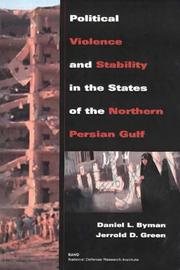| Listing 1 - 10 of 25 | << page >> |
Sort by
|
Book
ISBN: 0833083430 0833080903 9780833083432 9780833080905 Year: 2013 Publisher: [Santa Monica, CA] RAND Corporation
Abstract | Keywords | Export | Availability | Bookmark
 Loading...
Loading...Choose an application
- Reference Manager
- EndNote
- RefWorks (Direct export to RefWorks)
Political stability --- Mali --- Politics and government --- Destabilization (Political science) --- Political instability --- Stability, Political --- Consensus (Social sciences) --- Legitimacy of governments

ISBN: 0833043390 0585245150 9780585245157 9780833043399 9780833027269 0833027263 0833027263 Year: 1999 Publisher: Santa Monica, CA Rand
Abstract | Keywords | Export | Availability | Bookmark
 Loading...
Loading...Choose an application
- Reference Manager
- EndNote
- RefWorks (Direct export to RefWorks)
Political violence threatens the lives of U.S. soldiers and the stability of U.S. allies throughout the world. This report examines the threat of political violence in the Persian Gulf states of Saudi Arabia, Kuwait, Bahrain, and the United Arab Emirates and the best means of reducing that threat. It assesses sources of discontent, common reasons for anti-regime politicization, potential triggers of violence, and the influence of foreign powers. The report then describes the strategies that regimes in the area have used to interfere with political organization and to counter violence in general. The report concludes by noting implications of political violence for both the United States and its allies in the Gulf, and by assessing the impact of various measures that could reduce violence: enacting political and economic reforms in the Gulf; changing the U.S. presence in the region through new basing and operational approaches; increasing a European role in Gulf security; coercing foreign powers that contribute to violence; strengthening the U.S.-Gulf partnership; and improving military-to-military ties.
Political violence --- Political stability --- Destabilization (Political science) --- Political instability --- Stability, Political --- Consensus (Social sciences) --- Legitimacy of governments --- Violence --- Political crimes and offenses --- Terrorism
Book
ISBN: 9264086129 9264128476 Year: 2011 Publisher: Paris : OECD,
Abstract | Keywords | Export | Availability | Bookmark
 Loading...
Loading...Choose an application
- Reference Manager
- EndNote
- RefWorks (Direct export to RefWorks)
The Monitoring Survey of the Principles for Good International Engagement in Fragile States and Situations provides one of the only sources of evidence of development impact in fragile and conflict-affected states. Based on 13 national consultations and using a mixed methods approach, the survey has catalysed dialogue among national and international stakeholders and contributed to deepening consensus on key goals and priorities. This report synthesises main findings and recommendations from across these 13 countries, providing evidence from the ground of what works and what doesn’t.
Social stability --- Economic assistance --- History & Archaeology --- History - General --- Social stability. --- Economic assistance. --- Political stability. --- Developing countries --- Foreign relations. --- Destabilization (Political science) --- Political instability --- Stability, Political --- Economic aid --- Foreign aid program --- Foreign assistance --- Grants-in-aid, International --- International economic assistance --- International grants-in-aid --- Stability, Social --- Consensus (Social sciences) --- Legitimacy of governments --- Economic policy --- International economic relations --- Conditionality (International relations) --- Social history --- Sociology --- Progress
Book
ISBN: 1451864728 1462300359 145190925X 9786613821812 1452705747 1282474286 Year: 2006 Publisher: Washington, D.C. : International Monetary Fund,
Abstract | Keywords | Export | Availability | Bookmark
 Loading...
Loading...Choose an application
- Reference Manager
- EndNote
- RefWorks (Direct export to RefWorks)
The purpose of this paper is to empirically determine the causes of worldwide diversity of inflation volatility. We show that higher degrees of political instability, ideological polarization, and political fragmentation are associated with higher inflation volatility.
Electronic books. -- local. --- Inflation (Finance) -- Econometric models. --- Political stability -- Econometric models. --- Finance --- Business & Economics --- Money --- Inflation (Finance) --- Political stability --- Econometric models. --- Destabilization (Political science) --- Political instability --- Stability, Political --- Consensus (Social sciences) --- Legitimacy of governments --- Inflation --- Macroeconomics --- Agribusiness --- Price Level --- Deflation --- Energy: Demand and Supply --- Prices --- Agriculture: General --- Agricultural economics --- Oil prices --- Agricultural sector --- Agricultural industries

ISBN: 3801203212 9783801203214 Year: 2002 Publisher: Bonn J.H.W. Dietz
Abstract | Keywords | Export | Availability | Bookmark
 Loading...
Loading...Choose an application
- Reference Manager
- EndNote
- RefWorks (Direct export to RefWorks)
Political stability --- Crisis management --- Peace-building --- 856.4 Conflictresolutie --- Building peace --- Peacebuilding --- Conflict management --- Peace --- Peacekeeping forces --- Crises --- Management of crises --- Management --- Problem solving --- Destabilization (Political science) --- Political instability --- Stability, Political --- Consensus (Social sciences) --- Legitimacy of governments --- Central America --- Africa, Northeast --- Asia, Central --- Politics and government.
Book
ISBN: 926412859X 9264094792 Year: 2011 Publisher: [Paris] : OCDE,
Abstract | Keywords | Export | Availability | Bookmark
 Loading...
Loading...Choose an application
- Reference Manager
- EndNote
- RefWorks (Direct export to RefWorks)
Ce rapport expose les résultats de la seconde Enquête de suivi de la mise en oeuvre des Principes d'engagement international deans les États fragiles et les situations précaires. Il est basé sur des consultations nationales menées dans les 13 pays (contre 6 pays en 2009) ayant répondu à l'appel concernant le suivi de la mise en oeuvre des PEF par les partenaires au développement, consultations qui ont reçu le soutien de la communauté internationale, au sein de laquelle le PNUD a joué un rôle central.
Social stability. --- Economic assistance. --- Political stability. --- Developing countries --- Foreign relations. --- Destabilization (Political science) --- Political instability --- Stability, Political --- Consensus (Social sciences) --- Legitimacy of governments --- Economic aid --- Foreign aid program --- Foreign assistance --- Grants-in-aid, International --- International economic assistance --- International grants-in-aid --- Economic policy --- International economic relations --- Conditionality (International relations) --- Stability, Social --- Social history --- Sociology --- Progress

ISBN: 1848136153 128125908X 9786611259082 1848131208 9781848131200 9781281259080 1842774441 184277445X 9781842774441 9781842774458 Year: 2004 Publisher: London ; Zed Books
Abstract | Keywords | Export | Availability | Bookmark
 Loading...
Loading...Choose an application
- Reference Manager
- EndNote
- RefWorks (Direct export to RefWorks)
This volume explores recent evidence of how partial state failure in Latin America interacts with new forms of organized violence, undermining the democratic consolidations of the past two decades. This 'new violence' stems from a variety of social actors: drug mafias, peasant militias and urban gangs, the socalled actores armadas, and include state-related actors like the police, military intelligence agencies and paramilitary forces. The results include both 'governance voids' - domains where the legitimate state is effectively absent - and the erosion of the capacity and willingness of stat
Violence --- Political violence --- Political stability --- Failed states --- State failure --- Political science --- Destabilization (Political science) --- Political instability --- Stability, Political --- Consensus (Social sciences) --- Legitimacy of governments --- Political crimes and offenses --- Terrorism --- 841.1 Democratisering --- 841.2 Zwakke staten --- 844 Sociale structuur --- 855.2 Private actoren --- 882.2 Zuid-Amerika --- 882.4 Noord-Amerika --- Violence politique --- Stabilité politique
Book
ISBN: 9780199693153 Year: 2011 Publisher: Oxford Oxford University Press
Abstract | Keywords | Export | Availability | Bookmark
 Loading...
Loading...Choose an application
- Reference Manager
- EndNote
- RefWorks (Direct export to RefWorks)
"Overcoming state fragility is one of the most important international development objectives of the 21st century. Many fragile states have turned into failed states, where millions of people are caught in deprivation and seemingly hopeless conditions. Fragile states lack the authority, legitimacy, and capacity that a modern state needs to advance the development of its peoples, and present deep challenges for the design and implementation of development policy. For instance, how is aid to be designed and delivered in a way that will help people in fragile states if their governments lack capacity to absorb and use aid? And what can be done about adverse side-effects of fragile states on their neighbours and the global community, such as heightened insecurity, rising out-migration, displaced populations, and the destruction of natural resources? This book documents the far reaching global repercussions of state fragility and provides a timely contribution to the international discourse on three dimensions of fragile states: their causes, costs, and the responses required. It will appeal to scholars, policymakers, and donors who are concerned about conflict and development. Its aim is to contribute to our understanding of how strong and accountable states can be fostered-states where government and civil society progressively advance human wellbeing, underpin households' resilience in the face of shocks, and form effective partnerships to maximize the benefits of development assistance."--Publisher's website.
Political systems --- Conflict management --- Political stability --- 321.1 --- AA / International- internationaal --- 841 Politiek bestel --- Destabilization (Political science) --- Political instability --- Stability, Political --- Consensus (Social sciences) --- Legitimacy of governments --- Conflict control --- Conflict resolution --- Dispute settlement --- Management of conflict --- Managing conflict --- Management --- Negotiation --- Problem solving --- Social conflict --- Crisis management --- Theorie, ontstaan en evolutie van de staat
Book
ISBN: 1484301986 1484339266 1484312864 Year: 2013 Publisher: Washington, D.C. : International Monetary Fund,
Abstract | Keywords | Export | Availability | Bookmark
 Loading...
Loading...Choose an application
- Reference Manager
- EndNote
- RefWorks (Direct export to RefWorks)
The aim of this paper is to analyze the dynamic effect of social and political instability on output. Using a panel of up to 183 countries from 1980 to 2010, the results of the paper suggest that social conflicts have a significant and negative impact on output in the short-term with the magnitude of the effect being a function of the intensity of political instability. The results also show that the recovery of output over the medium-term depends on the ability of the country to implement, in the aftermath of a social instability episode, reforms aimed at improving the level of governance. The results are robust to different checks and estimation strategies.
Political stability. --- Economic development --- Destabilization (Political science) --- Political instability --- Stability, Political --- Consensus (Social sciences) --- Legitimacy of governments --- Political aspects. --- Macroeconomics --- Macroeconomics: Consumption, Saving, Production, Employment and Investment: Other --- Mobility, Unemployment, and Vacancies: General --- Business Fluctuations --- Cycles --- Macroeconomics: Production --- Production growth --- Production --- Economic theory --- Egypt, Arab Republic of
Book
ISBN: 1315669625 1317364678 1857438043 Year: 2017 Publisher: Abingdon, Oxon : Routledge,
Abstract | Keywords | Export | Availability | Bookmark
 Loading...
Loading...Choose an application
- Reference Manager
- EndNote
- RefWorks (Direct export to RefWorks)
Argentina --- Political stability --- Economic conditions --- Economic policy. --- Destabilization (Political science) --- Political instability --- Stability, Political --- Consensus (Social sciences) --- Legitimacy of governments --- Argenṭinah --- Argenṭine --- Argentine Confederation (1851-1861) --- Argentine Nation --- Argentine Republic --- Aruzenchin --- Confederación Argentina (1851-1861) --- Nación Argentina --- República Argentina --- アルゼンチン --- Provincias Unidas del Río de la Plata
| Listing 1 - 10 of 25 | << page >> |
Sort by
|

 Search
Search Feedback
Feedback About UniCat
About UniCat  Help
Help News
News